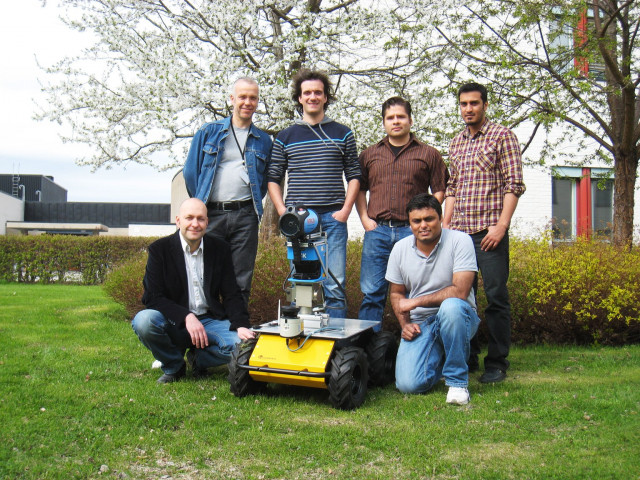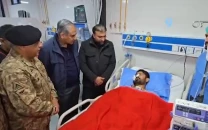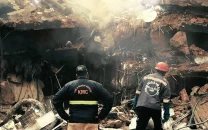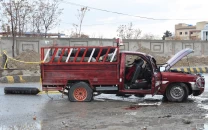From rundown Badin school to robots in Sweden
Roboticist Asif Arain helps create Gasbot – a robot which can accurately detect dangerous gas leaks from a distance

Asif Arain with his group and the robot in Sweden. PHOTO: ASIF ARAIN
Created by researchers at Sweden’s Örebro University, Gasbot is a robotic solution to mitigate gas emissions in the environment. “Gasbot is a dedicated system developed with the primary objective of monitoring emissions with accuracy,” Arain tells The Express Tribune.
Born in a small village of Sindh's Badin district, Arain had a simple childhood with hardworking parents and dedicated teachers. After completing his primary education from a government school in the village, he went to Golarchi for matriculation, but it didn't end there. He went on to Badin city for higher secondary education and Mehran University, Jamshoro for engineering studies before he travelled to Italy, Poland and Sweden for Master’s and PhD.
As part of his doctorate studies in Sweden, Arain set out to write algorithms that would make Gasbot self-reliant for gas mapping purposes. The robot smells harmful gases using spectroscopy and is armed with state-of-the-art sensors for self-localisation and navigation. The design makes it perfect for detecting leakages at uneven surface of landfills that Arain’s team is targeting.
 Asif Arain controls the Gasbot. PHOTO: ASIF ARAIN
Asif Arain controls the Gasbot. PHOTO: ASIF ARAIN“Gasbot combines different sensors such as gas, wind, temperature and distance on a mobile platform to perform tasks such as gas leak detection, gas concentration distribution modeling and gas source localisation,” the robotics engineer explains.
Arain says the above mentioned tasks are dangerous for human operators carrying gas sensors around large and unstructured landfills, massive high pressure pipelines or a site of fire. “Gasbot, in such situations, accurately measures gases remotely with its sophisticated monitoring system – a task not possible otherwise.”
The Pakistani engineer says the leakage of greenhouse gases not only destroys the ozone layer and harms living things due to the explosive quality, but also causes economic losses as these gases are a source of energy.
His robot has been successfully tested in a decommissioned landfill and an underground tunnel where it was used to locate the source of leakage.
Read: IBA team’s robot hacks its way to the bronze in RoboCup Iran Open 2014
Arain algorithms enable the robot to decide where to sense within time and power limitations. “A mobile robot has limited on-board resources such as battery power and my sensor planning algorithms allow efficient use of such resources,” he explains, elaborating the algorithm generates a minimal set of measurement points and guarantees complete coverage of the environment to detect gas leaks accurately.
“For the modeling of gas distribution in the area, my algorithm provides a solution for the sensor placements that build a high quality gas distribution map."
Prior to his contribution, gas distribution maps were generated by collecting measurements at predefined positions marked by a human operator. “This would or would not produce a good quality representation of the gas distribution. But Gasbot can efficiently decide on its own where to take the measurements,” Arain explains, as he shares details of his yet to be published work.
Having worked in Pakistan’s fertilisers sector for quite some time, Arain says our industries rarely comply with international emission limits. “There is a huge potential in deploying emission monitoring systems in Pakistan given our high air pollution rate and leakages during transportation of high pressure gas and Gasbot is one possible solution,” he says.
Gasbot has garnered attention in the scientific community as well as the media. In 2013, the team was given the “Best Service Robotics Paper Award” at one of the leading robotics conferences - IEEE International Conference on Robotics and Automation (ICRA) and was featured on Robotdalen - a Swedish robotics initiative which enables commercial success of new ideas and research within robotics and automation.
Proud of his crucial contribution in developing the robot, Arain advises future engineers from Pakistan to develop critical thinking and shun brainless memorization. “What I lacked most was better understanding of fundamental mathematics; our education system due to limited resources focuses on memorising rather than understanding, however, it is crucial to understand the basics no matter what you pursue in the future,” the engineer shares his experience.
Having spent five years studying and working abroad, Arain stresses the importance of secular and liberal values for progress. “I have spent a major part of my life among religious extremists and I can see how our narrow mindset is our biggest problem,” the engineer says, adding that an open culture based on equality - especially gender and belief equality - and freedom of expression is the way to move forward.



















COMMENTS
Comments are moderated and generally will be posted if they are on-topic and not abusive.
For more information, please see our Comments FAQ